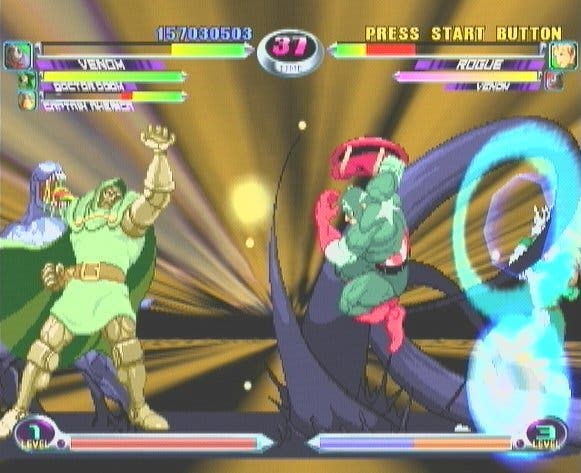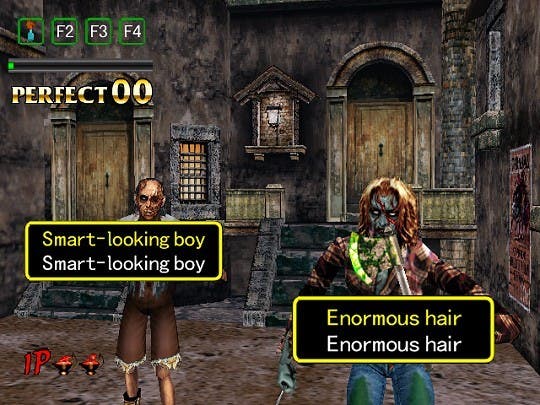Dreamcast Cult Classics
21 games that deserved better.
Samba de Amigo
SEGA/Sonic Team
If it wasn't for the recent Wii re-issue of Sonic Team's maraca-shaking rhythm-action effort, this would have been the Dreamcast's most obvious Cult Classic. Available for around GBP 100 at launch, UK figures from Chart-Track reckon that fewer than 2,500 gamers bought it back in December 2000, making it one of the most collectible games of the decade - not to mention one of the most improbable multiplayer games of all time (finding another player with a set of maracas is going to be a tall order, obviously). With SEGA opting not to bother releasing official maraca peripherals for the Wii, those who own the coveted Dreamcast original can shake their moneymakers with pride.
Confidential Mission
SEGA/Hitmaker
By the time this overlooked lightgun shooter hit the DC in the summer of 2001, the writing was already well and truly on the wall for the troubled console, with the momentum having swung in favour of the PS2. But for those who stuck with SEGA's system, Confidential Mission was an excellent companion release to The House of the Dead 2. Similar in style to the Virtua Cop titles (none of which got a format release on DC in the West), it was a typically over-the-top spy thriller romp, with two agents on a mission to retrieve a stolen satellite. As you might expect, it's about as derivative as possible, but with so few lightgun shooters available in the home, it was an essential purchase for those hankering after a bit of twitch shooting craziness.

Marvel Vs Capcom 2
Capcom
When Midway tried to jumpstart its stalled Mortal Kombat franchise by pairing it with a cast of comic legends from the DC universe, it was blatantly hoping to hark back to this absolute gem of a fighter. With 56 characters, three-way tag teams and new "snapback" attacks, the lure of pitting Mega Man and Wolverine against Doctor Doom and Akuma was hard to resist, especially with the sort of deep yet balanced gameplay you'd expect from the Street Fighter team. This was also a game where the Dreamcast's architecture shone brighter than the competition. Thanks to the shared features of the console and the arcade's NAOMI board, it was able to supply a nigh-perfect conversion.
Headhunter
SEGA/Amuze
Billed as the DC's answer to Metal Gear Solid, the hype was strong for Amuze's stealth-action title. Fortunately, it wasn't all hot air, as a string of positive reviews in the dying embers of 2001 gave brief weight to the belief that SEGA's console was still a viable entity if only a must-have action-adventure came along. But while its somewhat derivative brand of action-adventuring wasn't quite the console's saving grace, it's definitely one of the system's strongest in the genre thanks to tight controls and slick visuals. Shame about the tired premise of having lost his identity, memory and blah, I-was-the-best-headhunter-in-the-land-and-have-to-prove-myself-all-over-again-blah. It was 2001, though.
Daytona USA
SEGA/Amusement Vision
After the various arcade versions caused such a commotion during the latter half of the 90s, everyone assumed an arcade-perfect port would go down a storm on Dreamcast. But as with all of SEGA's attempts to revive its racing brands this decade (see OutRun 2 and SEGA Rally for proof), only a few hardcore diehards bought into it. Despite poor sales, Daytona USA did pick up its fair share of fans, as evidenced by the massive number of enormously positive reviews from around the spring of 2001. Hindsight is a wonderful thing, though, and many have since criticised the port's inability to quite match the arcade's control system - particularly with the wheel. Still, with no subsequent attempts to revive the long-dormant Daytona brand, this DC-exclusive version retains an elusive appeal, and is more than welcome down Cult Classic alley.

Typing of the Dead
SEGA/Smilebit
Come on, who doesn't like to hone their secretarial skills while dismembering the undead? Just one of several bizarre SEGA offerings to grace the Dreamcast, this keyboard-based spin-off from the House of the Dead rail shooter series still raises an eyebrow today. As you'd expect, using the separate Dreamcast keyboard peripheral, players killed zombies not by blasting their heads off with a gun, but by accurately typing the words on the screen. Boss battles mixed things up, demanding rapid entry of long phrases or answers to trivia questions. Thankfully, once you get past the sheer "huh?" factor of the concept, Typing of the Dead is actually a really fun game, with lots of silly easter eggs and laughs to be had.
Trickstyle
Acclaim/Criterion
In September 1999, all eyes were on skateboarding legend Tony Hawk and his Pro Skater game, which brought the thrills and spills of skating to joypads with unprecedented success. This, sadly, meant that most people overlooked this broadly similar hoverboard game from Criterion, then several years away from Burnout's fame and fortune. Set in futuristic versions of London, Tokyo and New York, the game focused more on racing than its real-world rival, but still offered a robust selection of stunt moves to master. When the Dreamcast wheezed its last, Criterion returned to the concept for the more warmly received Airblade on the PS2 in 2001.
Fur Fighters
Acclaim/Bizarre Creations
Another early Dreamcast offering from a Britsoft developer that would go on to greater success, this third-person action game trod similar turf to the likes of Conker's Bad Fur Day by mixing cute animals with intense violence. As well as allowing players to switch between six animal heroes on a quest to save your babies from the evil General Viggo, the game also boasted 17 weapons and 26 large and intricate levels. Enough, you'd think, to make it a hit with the gaming public, but after a lukewarm retail reception the game has had to make do with posthumous cult popularity instead.







